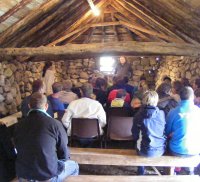 1 July -
In line with tradition, today there was an outdoor service in Bjerkreim.
In line with tradition, it poured down, so we ended up having it indoors in a farm building.
Click photo, left, for picture sequence.
1 July -
In line with tradition, today there was an outdoor service in Bjerkreim.
In line with tradition, it poured down, so we ended up having it indoors in a farm building.
Click photo, left, for picture sequence.
 Click here to go back to main page.
Click here to go back to main page.
 1 July -
In line with tradition, today there was an outdoor service in Bjerkreim.
In line with tradition, it poured down, so we ended up having it indoors in a farm building.
Click photo, left, for picture sequence.
1 July -
In line with tradition, today there was an outdoor service in Bjerkreim.
In line with tradition, it poured down, so we ended up having it indoors in a farm building.
Click photo, left, for picture sequence.
 4 July -
Katie decided that it was a long time since we had played cricket, and it seemed like the thing to do on American Independence Day (just to show them),
so after a good hunt for bats and balls we set about improvising a wicket.
Our box lid worked very well.
Matt hit a splendid six into the bullock field.
Once he'd found the ball, he then threw it into our meadow, where it is still lurking somewhere.
Another ball was produced and play resumed (click photo, right, for larger picture).
It was never like this at Lord's.
4 July -
Katie decided that it was a long time since we had played cricket, and it seemed like the thing to do on American Independence Day (just to show them),
so after a good hunt for bats and balls we set about improvising a wicket.
Our box lid worked very well.
Matt hit a splendid six into the bullock field.
Once he'd found the ball, he then threw it into our meadow, where it is still lurking somewhere.
Another ball was produced and play resumed (click photo, right, for larger picture).
It was never like this at Lord's.
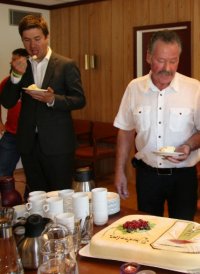 5 July -
The Mayor is looking pleased as he cuts into the windmill cake to celebrate a government announcement today which gives final approval for two windmill parks in our local-authority district.
These two parks will produce (for those who are technically-minded) a total effect of over 400 MW and an annual production of about 1.3 TWh
- and will provide about 1000 job-years in the district (which has a total population of a couple of thousand),
not to mention an income of tens of thousands of pounds per household per year for the local authority.
5 July -
The Mayor is looking pleased as he cuts into the windmill cake to celebrate a government announcement today which gives final approval for two windmill parks in our local-authority district.
These two parks will produce (for those who are technically-minded) a total effect of over 400 MW and an annual production of about 1.3 TWh
- and will provide about 1000 job-years in the district (which has a total population of a couple of thousand),
not to mention an income of tens of thousands of pounds per household per year for the local authority.
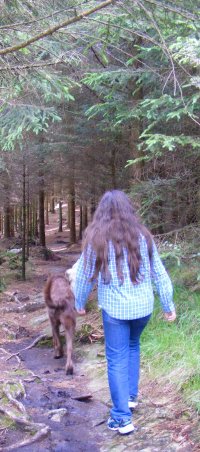 A walk in the woods.
Just over the road from Katie's school there's an area of pine forest and a large lake.
Katie's class often goes across there to let off steam playing "capture the flag" and such like.
"You'd never believe", said Katie whilst we were walking through the forest this morning after visiting the shop,
"that there could be such a lovely place in the middle of a busy town like Vikeså".
Click photo, right, to see an aerial photo of the school and the forest area -
and don't fail to notice what a busy urban area this is -
followed by a six photos from our walk through the trees and to the lake's edge.
A walk in the woods.
Just over the road from Katie's school there's an area of pine forest and a large lake.
Katie's class often goes across there to let off steam playing "capture the flag" and such like.
"You'd never believe", said Katie whilst we were walking through the forest this morning after visiting the shop,
"that there could be such a lovely place in the middle of a busy town like Vikeså".
Click photo, right, to see an aerial photo of the school and the forest area -
and don't fail to notice what a busy urban area this is -
followed by a six photos from our walk through the trees and to the lake's edge.
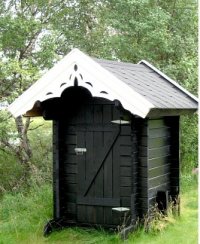 The smallest house.
A few years ago we spotted a smallish house in England to which its owners had given the Welsh name "Tŷ Bach" (literally, "small house").
Anyone from Wales knows exactly what the phrase really means.
Here (photo, left - click for enlargement) is a photo of the smallest building owned by the Norwegian state - part of a police station, as it happens.
And yes, it really is a tŷ bach - a privvy - and is in daily use as such at the police station.
We include this information merely as an example of the sort of things being covered by the Norwegian news at this rather quiet time of year.
The smallest house.
A few years ago we spotted a smallish house in England to which its owners had given the Welsh name "Tŷ Bach" (literally, "small house").
Anyone from Wales knows exactly what the phrase really means.
Here (photo, left - click for enlargement) is a photo of the smallest building owned by the Norwegian state - part of a police station, as it happens.
And yes, it really is a tŷ bach - a privvy - and is in daily use as such at the police station.
We include this information merely as an example of the sort of things being covered by the Norwegian news at this rather quiet time of year.
11 July - It's Tracy and Tim's wedding anniversary today (25 years completed!), even though the circumstances are not what we had anticipated. Tracy arrived safely home from Cambodia last night (see her Cambodia travel blog) and we're all setting off now for the funeral visit to England.
18 July - Thomas Andrew and Tim are back home in Ørsdalen after the funeral trip to England; Tracy, Katie and Matt are staying on in England for a few more days. Tracy's father, Rob, was celebrated and remembered by family and friends. Naturally, the only hitch of the day involved us, when the funeral car that was returning us from the crematorium got completely lost ("which way is it from here? I've no idea"), but that's the way of things.
Almost three years ago, on 12 October 2009 we wrote about our first visit to England after moving here, also for a family funeral. Like this time, we flew from Haugesund to Stansted and hired a car. We described in 2009 how the people at Herz in Stansted were extraordinarily unhelpful, rude and unpleasant. So this time we hired a car from a firm we'd never heard of before, called Green Motion. If ever you find yourself at Stansted and in need of a hire car, go there. In fact, go to Stansted and hire a car from them whether you need one or not, just for the experience. The couple running the office greeted us warmly, with genuinely-friendly conversation. We had been intending to put Tracy down as a named driver, but when we found out that there was a £30 charge we decided not to bother. "Yes, it is a bit expensive - tell you what: would £15 be better?", they said. So we did. We had a similar discussion about reserving funds on the credit card to cover the insurance excess - and when I produced our all-year hire-car excess insurance they were able to reduce the amount they took. Sensible, but I've never met a car-hire company that would do it before. We told them the purpose of our visit and they were sympathetic. After inviting us to their daughter's wedding and making us a packed lunch for the journey (well, that bit might be a slight exaggeration, but they really were lovely people) they showed us the car - an i30 which was one of the best hire cars we've driven, including the Mercedes and Audis in Germany. All in all, a good experience, which for us has helped restore our tarnished image of Stansted and hire cars.
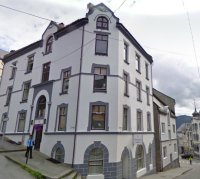 Beth has just moved from Skodje into the centre of Ålesund (her new address is on the main page) -
the top floor of the building you can see on the photo, left (click for enlargement),
next door to the Rica Parken hotel.
Beth has just moved from Skodje into the centre of Ålesund (her new address is on the main page) -
the top floor of the building you can see on the photo, left (click for enlargement),
next door to the Rica Parken hotel.
The blog goes on holiday
(click on any of the small photos for enlargements).
Thursday 26 July - We were to catch the 8 am ferry from Kristiansand to Hirtshals. A three-hour drive to Kristiansand as well as an hour’s check-in time didn’t really appeal, but happily we were invited to stay the previous night with our good friends just outside Kristiansand. These are friends we have known for 26 years – since before we came to live in Norway – and who we value very greatly, so it was a good start to the trip. Their oldest daughter was also visiting. In our mind she’s about 5 years old, but as she had her 13-year-old son with her it seems we’re a bit behind the times.
It’s an easy high-speed ferry crossing to Denmark (a little over 3 hours) and a 4-hour drive along one motorway takes you from the ferry port (Hirtshals, “Gateway to Europe”) to the German border.
“Is Ausfahrt a big place?” asked Katie. “They’ve been signposting it at every exit since we arrived in Germany”. That rather reminds me of our family trip to Switzerland when I was 6 years old. I’m still full of admiration for my father who managed to find and book a holiday house in a remote village in the middle of Switzerland and then navigate and drive an early-1960s car containing a family of three small children all the way to it. It was really a fantastic achievement. The only thing he lacked was any knowledge of German, which is why we spent some happy days searching endless forest tracks for the elusive village of Wanderweg, which was always being signposted as an attraction to be found just round the next corner. And 40-odd years later the Swiss postal service is still talking about the letter he wrote to book the house. My dad had thought it was rather a long address; what he actually wrote on the envelope was “pleasant 3-storey villa on the edge of the woods, overlooking the valley and the river, adjacent to a farm ...”. Apparently the postman had the letter in his pocket for about three days so that he could check the view from every three-storey house he could find to see whether it matched the description. But the letter arrived, and so did we in due course. But we never did get to Wanderweg.
Vocabulary for that paragraph: Ausfahrt=Exit ; Wanderweg=Footpath/Trail.
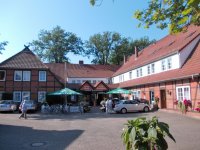 Tracy, Katie and Tim arrived, however, at the Hotel Acht Linden in Egesdorf, some miles south of Hamburg. We’ve booked hotels for the first few nights using a German website with which Tim (who is often in Germany in connection with concerts) has an account and gets good discounts.
On the whole, German hotels are excellent and very reasonably priced (especially given that the Euro is currently about half its usual value in relation to the Norwegian krone). So we were interested to see what we would get for our 600 kroner’s worth of hotel (for the three of us, including breakfast). What we got was a beautiful, comfortable room, partitioned into two sections (one double bed in one section and a single bed in the other), very well furnished and immaculately decorated, a top-quality bathroom and a fantastic breakfast. We felt that we were in the lap of luxury. We had an excellent dinner in the sunshine in the outdoor restaurant. If things continue like this we will have the holiday of a lifetime.
Tracy, Katie and Tim arrived, however, at the Hotel Acht Linden in Egesdorf, some miles south of Hamburg. We’ve booked hotels for the first few nights using a German website with which Tim (who is often in Germany in connection with concerts) has an account and gets good discounts.
On the whole, German hotels are excellent and very reasonably priced (especially given that the Euro is currently about half its usual value in relation to the Norwegian krone). So we were interested to see what we would get for our 600 kroner’s worth of hotel (for the three of us, including breakfast). What we got was a beautiful, comfortable room, partitioned into two sections (one double bed in one section and a single bed in the other), very well furnished and immaculately decorated, a top-quality bathroom and a fantastic breakfast. We felt that we were in the lap of luxury. We had an excellent dinner in the sunshine in the outdoor restaurant. If things continue like this we will have the holiday of a lifetime.
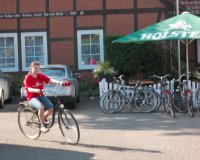
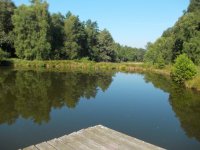 Friday 27 - This morning we borrowed bicycles (free courtesy of the hotel) and explored the surrounding countryside, which is very beautiful. Long, deserted, lanes and tracks through lovely rolling countryside.
Friday 27 - This morning we borrowed bicycles (free courtesy of the hotel) and explored the surrounding countryside, which is very beautiful. Long, deserted, lanes and tracks through lovely rolling countryside.
In the afternoon we drove to mid-Germany, where we’re staying for three days in a small, family-owned hotel in which Tim has stayed many times over the years. This is our cheapest accommodation of the trip, but still very high quality room and breakfast. The hotel owner enquired after Thomas Andrew, who she remembered well from previous visits (he, of course, is at home, working) and presented us with two bottles of very good local wine as a reward for good custom. We bought dinner at the hotel – one of the best meals we’ve had in a restaurant for years. The only downside is that the weather is very hot. So hot that it’s hard to sleep.
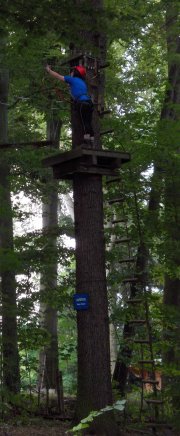 Saturday 28 - Monday 30 - Our days have been filled with activities. At a “Go-Ape” centre we spent some hours in the treetops, navigating an obstacle course. We all enjoyed the challenges. Katie was wonderful – especially when the staff reckoned that one of the highest-level challenges was likely to be too difficult for her and offered her a ladder down to ground level. “Nein!” was her stern answer and she amazed them (and herself) by completing it – mostly “just to show them”.
(For set of photos click small picture, left).
Saturday 28 - Monday 30 - Our days have been filled with activities. At a “Go-Ape” centre we spent some hours in the treetops, navigating an obstacle course. We all enjoyed the challenges. Katie was wonderful – especially when the staff reckoned that one of the highest-level challenges was likely to be too difficult for her and offered her a ladder down to ground level. “Nein!” was her stern answer and she amazed them (and herself) by completing it – mostly “just to show them”.
(For set of photos click small picture, left).
During a Saturday visit to a historic town, where Katie bought a new school rucksack and we visited the town museum, we found that there were two separate weddings going on. The one wedding was evidently that of a fireman or firewoman, because the town fire engines turned out in force. Common to both weddings, though, was the newly-married couple were given a saw and a large log to cut through. Whether this represented their ability to gather firewood for the winter, their skills at building a new house, or simply overcoming challenges together, it was in any event a tradition that created a good deal of entertainment. Another tradition was that after each wedding a long procession of cars (and, where appropriate, fire engines) followed the bridal car on a lap of the town, tooting horns all the way, so it was not a quiet afternoon in town.
We visited a water-park with indoor and outdoor swimming pools and huge waves, rapids, all manner of jacuzzis and other features.
The car was also treated to a service at a main dealership (considerably cheaper than in Norway and very good workmanship).
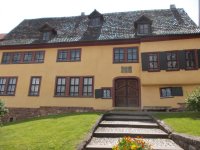 Finally, we visited the Bach museum in Eisenach – surprisingly good and interesting.
Finally, we visited the Bach museum in Eisenach – surprisingly good and interesting.
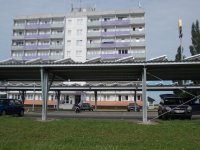 After three nights in the familiar hotel we needed to change locations to be closer to Eisenach, so we again turned to the German hotel website. One of the advantages and disadvantages with this way of planning a holiday is that it is very much a lottery. Our first night’s hotel had far exceeded expectations, but would tonight’s be as good? We soon had our answer. It was a concrete tower block that looked and felt like a stage set for a Cold-War East German spy movie – except that built onto the side of it was a huge, all-night Macdonald’s. This was faintly bizarre because the hotel was in the middle of no-where, surrounded by fields and miles from the nearest town of any size. Despite the size of the place, we seemed to be the only hotel guests, though it seemed that there were some permanent residents there. Again we had booked a “three-person room” and again we actually had two adjoining bedrooms and a bathroom – but this time the furnishings were sparse and when we tried the beds they were as unyielding as wooden boards. We ate at Macdonald’s and put sleeping bags over the mattresses in order to lie in more comfort. The views over the fields and far-distant village were spectacular and the hotel was roomy and clean, but we couldn’t shake off the feeling of DDR austerity, even down to the tasteless coffee at breakfast.
After three nights in the familiar hotel we needed to change locations to be closer to Eisenach, so we again turned to the German hotel website. One of the advantages and disadvantages with this way of planning a holiday is that it is very much a lottery. Our first night’s hotel had far exceeded expectations, but would tonight’s be as good? We soon had our answer. It was a concrete tower block that looked and felt like a stage set for a Cold-War East German spy movie – except that built onto the side of it was a huge, all-night Macdonald’s. This was faintly bizarre because the hotel was in the middle of no-where, surrounded by fields and miles from the nearest town of any size. Despite the size of the place, we seemed to be the only hotel guests, though it seemed that there were some permanent residents there. Again we had booked a “three-person room” and again we actually had two adjoining bedrooms and a bathroom – but this time the furnishings were sparse and when we tried the beds they were as unyielding as wooden boards. We ate at Macdonald’s and put sleeping bags over the mattresses in order to lie in more comfort. The views over the fields and far-distant village were spectacular and the hotel was roomy and clean, but we couldn’t shake off the feeling of DDR austerity, even down to the tasteless coffee at breakfast.
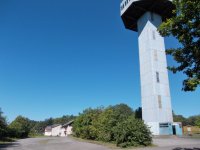 Tuesday 31 -
Today we drove south through Thüringen right to the border with Bayern (Bavaria). The landscape and scenery throughout the former East Germany is spectacular and never more so than over the hills of the Thüringen Forest. Tim has played many concerts around here and was desperate to show the area to Tracy because of the bad impression people sometimes have of “East Germany” as a dismal place – of which nothing could be further from the truth. From the usual website we had more-or-less randomly selected a small private hotel in Zimmerau, a village half a dozen miles from Römhild, a lovely village where Tim played a concert in 2007. After last night’s experience we wondered what the hotel would be like. We found it without trouble. It was another private hotel run by a man and his wife. Located some way from the edge of a small and lovely village, it had the most breathtaking views imaginable over the surrounding countryside. Our room was basic but very adequate and we enjoyed a good dinner in the restaurant (cooked by the wife and served by the husband, who was kept very busy serving local guests throughout the evening).
The stairs up to the car park had a strong smell of almonds (we never quite worked out why but imagine it was a cleaning substance).
It was a very strangely-designed building (for instance a long lounge in the shape of a railway carriage, with a line of seats and tables that looked as though a ticket-collector was about to come round), which we believe might have been used as a retreat centre at some time. The most puzzling thing, however was that next to the hotel was a vast tower (125 feet high!) with an observation platform on the top. What, we wondered, could this have been built for? It was described as a viewing tower and we could well understand that the view over the surrounding countryside was spectacular and worth viewing, but who had come up with the idea of such a monumental building in the remotest-possible village and how on earth were the owners ever to recoup such a vast investment by means of the 1-Euro admission fee (put your coin in the slot to get past the turnstile – and good luck on the stairs!).
(Photo, right - hotel is on left).
Tuesday 31 -
Today we drove south through Thüringen right to the border with Bayern (Bavaria). The landscape and scenery throughout the former East Germany is spectacular and never more so than over the hills of the Thüringen Forest. Tim has played many concerts around here and was desperate to show the area to Tracy because of the bad impression people sometimes have of “East Germany” as a dismal place – of which nothing could be further from the truth. From the usual website we had more-or-less randomly selected a small private hotel in Zimmerau, a village half a dozen miles from Römhild, a lovely village where Tim played a concert in 2007. After last night’s experience we wondered what the hotel would be like. We found it without trouble. It was another private hotel run by a man and his wife. Located some way from the edge of a small and lovely village, it had the most breathtaking views imaginable over the surrounding countryside. Our room was basic but very adequate and we enjoyed a good dinner in the restaurant (cooked by the wife and served by the husband, who was kept very busy serving local guests throughout the evening).
The stairs up to the car park had a strong smell of almonds (we never quite worked out why but imagine it was a cleaning substance).
It was a very strangely-designed building (for instance a long lounge in the shape of a railway carriage, with a line of seats and tables that looked as though a ticket-collector was about to come round), which we believe might have been used as a retreat centre at some time. The most puzzling thing, however was that next to the hotel was a vast tower (125 feet high!) with an observation platform on the top. What, we wondered, could this have been built for? It was described as a viewing tower and we could well understand that the view over the surrounding countryside was spectacular and worth viewing, but who had come up with the idea of such a monumental building in the remotest-possible village and how on earth were the owners ever to recoup such a vast investment by means of the 1-Euro admission fee (put your coin in the slot to get past the turnstile – and good luck on the stairs!).
(Photo, right - hotel is on left).
We found the answer. The village of Zimmerau lies on the border of Thüringen and Bayern (Bavaria) – in former times the border between East and West Germany. The two German governments had very different views of the border. The East-German government promoted the idea that the border was to keep out the ruthless militarists of the West, protecting the cause of “freedom”, and kept its civilians well away from the border. West Germany, however, wanted to emphasise that it was really all one country, described the border as "the demarcation line of the Soviet occupation zone" and encouraged tourism in order that people could peep across and see that "they're really the same as us". Thus it was that the Bayernturm tower was built in 1966 to give visitors a view across the border into East Germany.
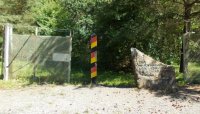 Some remains of the older border fortifications have been preserved – bits of fence, gates and barbed wire, together with a poster showing how the border looked during the Cold War. The width of “no-man’s land” and the severity of the border fences shown on the poster are astonishing.
Some remains of the older border fortifications have been preserved – bits of fence, gates and barbed wire, together with a poster showing how the border looked during the Cold War. The width of “no-man’s land” and the severity of the border fences shown on the poster are astonishing.
Now the only border is between various different types of experimental clover fields and protected habitats. There are bird hides everywhere (the surrounding countryside seems to be a bird-watching Mecca) and endless fields of corn, clover and flowers with a diversity of insect life and butterflies that we’ve never seen before.
 The lovely village church was surrounded by flowers and had an interesting door (click photo, right, for 2 larger pictures).
The lovely village church was surrounded by flowers and had an interesting door (click photo, right, for 2 larger pictures).
The neighbouring village of Sterberg contains a spectacular Baroque castle. We asked the hotel-owner about it and he told us a little dismissively that it was owned by what he termed “some sect or other – harmless people”. It is a bunch called “Menschenfreundliches Werk”, which is a spin-off of JW’s. In any event, they have some impressive towers to watch.
We were very tempted to stay longer, but we still had plans to fulfil before Saturday, by when we were to fly onwards to Spain. We asked the hotel owner where his customers come from. “The internet”, he said; “nearly all of them are Swedes on their way to and from Croatia”. It seems that the hotel is exactly half way between southern Sweden and Croatia and a uniquely-placed stopping-off point on the migration route.
Wednesday 1 August - We’d got as far south as we were going in eastern Germany and it was time to head west. After a long drive (including a stop at a shopping centre where – out of respect for the Croatia-bound Swedish tourists – we ate a dinner of Swedish meatballs at Ikea and bought Tracy a new satnav, which she spent quite a few miles afterwards persuading not to speak German to her) we reached Stuttgart and a thoroughly-average hotel, courtesy of the usual website.
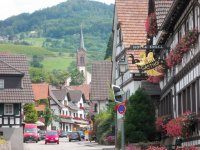 Thursday 2 - I was starting to get a little worried about the quality of the accommodation. I’d told Tracy that German hotels were very good and excellent value for money.
Things had indeed started very well indeed, but for the last three nights the quality had not been everything I’d promised. And now we faced another unknown. We had contemplated visiting some of the villages south of Stuttgart before heading northwards up to Heidelberg, so I’d booked a hotel in the Black Forest, half way between Stuttgart and Strasbourg.
We headed along the motorway and remarked that the scenery, which throughout East Germany had been spectacular, was now flat and rather uninteresting. But as we approached our destination, the village of
Sasbachwalden, hills started to appear ahead and the landscape became more attractive. And suddenly we found ourselves in a chocolate-box village, asking ourselves whether it was actually real or whether it was just a film-set. It was so perfect that it was unconvincing. Several pictures of village, click right.
The hotel was a half-timbered palace above the village, looking out over surrounding vineyards. We were given a guided tour of the hotel: “here is the coffee room – there are coffee and cakes at all times for you to help yourself; here is the swimming pool and relax/sauna area ...”) and then shown to our room. Rooms, rather – we had a little suite containing a bedroom, sitting room and bathroom for Tracy and I and an adjoining bedroom and bathroom for Katie. It was all furnished with beautiful, traditional antique furniture. We padded around our deep carpets and gawped at the elegance, before rushing for the pool.
Here are some pictures.
We went out into the village to check that it was real and to buy dinner in a good Italian restaurant.
Thursday 2 - I was starting to get a little worried about the quality of the accommodation. I’d told Tracy that German hotels were very good and excellent value for money.
Things had indeed started very well indeed, but for the last three nights the quality had not been everything I’d promised. And now we faced another unknown. We had contemplated visiting some of the villages south of Stuttgart before heading northwards up to Heidelberg, so I’d booked a hotel in the Black Forest, half way between Stuttgart and Strasbourg.
We headed along the motorway and remarked that the scenery, which throughout East Germany had been spectacular, was now flat and rather uninteresting. But as we approached our destination, the village of
Sasbachwalden, hills started to appear ahead and the landscape became more attractive. And suddenly we found ourselves in a chocolate-box village, asking ourselves whether it was actually real or whether it was just a film-set. It was so perfect that it was unconvincing. Several pictures of village, click right.
The hotel was a half-timbered palace above the village, looking out over surrounding vineyards. We were given a guided tour of the hotel: “here is the coffee room – there are coffee and cakes at all times for you to help yourself; here is the swimming pool and relax/sauna area ...”) and then shown to our room. Rooms, rather – we had a little suite containing a bedroom, sitting room and bathroom for Tracy and I and an adjoining bedroom and bathroom for Katie. It was all furnished with beautiful, traditional antique furniture. We padded around our deep carpets and gawped at the elegance, before rushing for the pool.
Here are some pictures.
We went out into the village to check that it was real and to buy dinner in a good Italian restaurant.
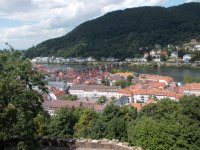 Friday 3 - Heidelberg is Germany’s “Oxford” – a “must-do” destination on any tour of Germany.
None of us had been there before. We strolled round the historic old city, took the funicular railway up the mountainside to the great castle (which is rated Germany's number-one tourist attraction), looked around the castle (including the apothecary museum and the big barrel that holds 55,345 gallons of wine) and admired the view over the river, watched some very strange sect in which obviously-Western people dressed up in turbans and robes and did funny dances while banging on tambourines and wailing in the street, and then left again.
It was great, but by this time we’d seen so much that somehow it took more than that to impress us.
If we’d come to it straight away I’m sure we’d have been thrilled.
Friday 3 - Heidelberg is Germany’s “Oxford” – a “must-do” destination on any tour of Germany.
None of us had been there before. We strolled round the historic old city, took the funicular railway up the mountainside to the great castle (which is rated Germany's number-one tourist attraction), looked around the castle (including the apothecary museum and the big barrel that holds 55,345 gallons of wine) and admired the view over the river, watched some very strange sect in which obviously-Western people dressed up in turbans and robes and did funny dances while banging on tambourines and wailing in the street, and then left again.
It was great, but by this time we’d seen so much that somehow it took more than that to impress us.
If we’d come to it straight away I’m sure we’d have been thrilled.
We had a flight to catch from Hahn at 10 am on Saturday, so we stayed the night less than 10 miles away from the airport in the village of Zell-Mosel, on the banks of the River Mosel.
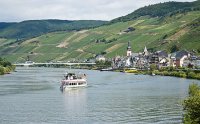 The village, framed by vineyards on every hillside and by the river flowing through the centre, was absolutely entrancing.
The pictures (such as this panorama view) don’t do it justice.
On the river there were passenger cruise boats, small boats and – most interestingly – a succession of huge Rhine barges (up to 360 foot long), carrying all sorts of cargo between Nancy in France and Europe's busiest waterway, the Rhine.
Nearly all of the barges carried one car on deck – whether as transport for someone else or for the crew to use, we don’t know. Almost every shop on the village street offered free wine tasting – it seems astonishing that anyone can walk upright to the end of the street – and the local population all seemed to be sitting sociably by the riverside, wine glass in hand.
The village, framed by vineyards on every hillside and by the river flowing through the centre, was absolutely entrancing.
The pictures (such as this panorama view) don’t do it justice.
On the river there were passenger cruise boats, small boats and – most interestingly – a succession of huge Rhine barges (up to 360 foot long), carrying all sorts of cargo between Nancy in France and Europe's busiest waterway, the Rhine.
Nearly all of the barges carried one car on deck – whether as transport for someone else or for the crew to use, we don’t know. Almost every shop on the village street offered free wine tasting – it seems astonishing that anyone can walk upright to the end of the street – and the local population all seemed to be sitting sociably by the riverside, wine glass in hand.
The hotel, though, looked disappointing, rather cramped and poorly-finished – and the nearest place to park the car was by the side of the main road, several hundred yards away. The hotel owner saw us come in and rushed across. ”Where did you park the car?” he asked. ”Come, follow me in my van”. We went back to the car and followed him to a different part of the village, where he stopped. When we got out of the car he thrust a bottle of wine into my hand. ”That’s to apologise for my mistake”, he said. ”You will stay here”. Then he fled. ”Here” turned out to be a run-down bed-and-breakfast with lumpy beds and dirty towels. We assume that the hotel owner had double-booked himself and made some arrangement with the b&b lady. The only good thing about the room was that it looked directly out over the river. And when we awoke in the night (as we did from time to time because of the uncomfortable beds) we could hear the swish of the barges on their way up-river or down-river with their night-time cargos. Soaring high above the vineyards on the opposite bank of the river was a big cross, which bizarrely was lit up in neon at night.
The river was calm and beautiful and we speculated about whether it’s possible to hire boats. But it’s not always like this. Last January, rain and melting snow up-river meant that the water level in the river was 30 feet higher than usual (yes, 30 feet!) and the village street in Zell-Mosel looked rather different (see photo here). A couple of days after this picture was taken, a 360-foot tanker full of acid, heading along the Rhine towards Antwerp, capsized just up-river from where the Mosel joins the Rhine at Koblenz, leading to traffic on the river being stopped.
Saturday 4 - Hahn airport was very straightforward. It was easy (and not too expensive) to find parking, even though with one thing and another we hadn’t managed to book it in advance, and the terminal was pleasant, efficient and not over-crowded. Hahn is one of those little local airports that Ryan Air adopted as a regional hub and re-branded absurdly as “Frankfurt Hahn” (in the same spirit as they took Norway’s Torp airport and called it “Oslo Torp”, Oslo being a three-hour bus ride away). Similarly, our destination (Jerez) was a small and pleasant airport, from where we collected our hire car and drove an hour and a half, past Seville and to our destination.
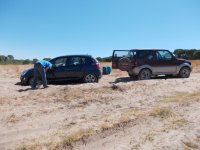
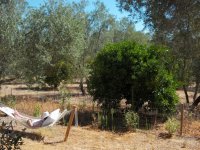 We knew that the house we’d rented was on the edge of a national park and that it was quite isolated, surrounded by miles of fruit trees and shrubland. We also knew that the road to the house was “challenging”.
But all these things are familiar to us and we had a series of images from Google Earth to help us find our way through the trees to the house. We almost managed it, too.
At the point where the car was irrevocably stuck up to the axles in deep sand which was too hot to touch (it was over 40° in the shade) we were, though we didn’t know it at the time, only about 100 yards from the house, a refreshing drink and submersion in the pool.
(Click photo, left, to see a short film clip of the arrival).
We knew that the house we’d rented was on the edge of a national park and that it was quite isolated, surrounded by miles of fruit trees and shrubland. We also knew that the road to the house was “challenging”.
But all these things are familiar to us and we had a series of images from Google Earth to help us find our way through the trees to the house. We almost managed it, too.
At the point where the car was irrevocably stuck up to the axles in deep sand which was too hot to touch (it was over 40° in the shade) we were, though we didn’t know it at the time, only about 100 yards from the house, a refreshing drink and submersion in the pool.
(Click photo, left, to see a short film clip of the arrival).
Sun 5-Friday 10 - our objective with this week was peace and relaxation, so we have no intention of travelling and doing much. In addition, it's 40° in the shade so we're not tempted to do much (photo, above right, of not doing much. Note one of many orange trees behind the fence.). The house we've rented is a pleasant surprise. It's beautifully decorated and equipped and has a large garden and small pool, as well as the freedom to go where we will on the neighbouring orange farm.
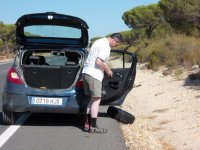
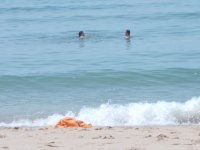 This area of Spain is not a tourist destination.
During the course of the week we didn't see more than one or two cars with foreign registrations and wherever we went we heard only Spanish spoken.
There is however a 60-mile-long, wide, sandy beach which even in the height of the tourist season was more or less empty,
except in and around the rather horrible tourist town of Matascalañas which seems to have been dropped unexpectedly in the midst of the national park.
We enjoyed a couple of visits to the beach, although on the first visit the car took revenge for the hammering we'd given its tyres on our arrival (photo, left).
This area of Spain is not a tourist destination.
During the course of the week we didn't see more than one or two cars with foreign registrations and wherever we went we heard only Spanish spoken.
There is however a 60-mile-long, wide, sandy beach which even in the height of the tourist season was more or less empty,
except in and around the rather horrible tourist town of Matascalañas which seems to have been dropped unexpectedly in the midst of the national park.
We enjoyed a couple of visits to the beach, although on the first visit the car took revenge for the hammering we'd given its tyres on our arrival (photo, left).
In the cool of the late evenings, we watched the geckos hunting for flies on the outside walls of the house (below right).
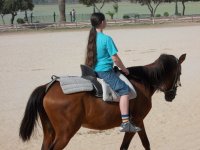
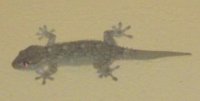 Last week, in Germany, we'd been astonished to find ourselves in the village of Sasbachwalden, which looked as though it belonged more on the box of a jigsaw puzzle than in real life.
We had a similar reaction when we dropped in at the village of El Rocío (the closest village to where we were staying).
This looked as though it was a film set for a western.
All the roads were of sand and every building had a horse-tying rail outside.
Click photo, left, for a set of pictures of the village.
Last week, in Germany, we'd been astonished to find ourselves in the village of Sasbachwalden, which looked as though it belonged more on the box of a jigsaw puzzle than in real life.
We had a similar reaction when we dropped in at the village of El Rocío (the closest village to where we were staying).
This looked as though it was a film set for a western.
All the roads were of sand and every building had a horse-tying rail outside.
Click photo, left, for a set of pictures of the village.
Saturday 11 - After many days in Germany and Spain, we decided that it would be pleasant to watch the televised closing ceremony of the Olympics in a country in which we spoke the language properly. The nearest such country was Denmark, which meant covering many miles in 24 hours. Landing at Hahn by 5 on Saturday evening we drove for 2-and-a-half hours to Wuppertal, which left us with a journey of 5-and-a-half hours on Sunday morning to get just the other side of the Danish border.
Wuppertal was a familiar place. I’ve been there several times, though never deliberately. Whenever I drive westwards on the motorway through Germany, on my way either to the lower Rhine area or to Holland/France, I always end up in the centre of Wuppertal. One moment I’m driving happily along Motorway 46, with BMWs appearing like little dots on the far horizon in my wing mirror before vanishing into the far horizon ahead of me, with no more than a little zzuupp noise as they flash past, and then the next second I find myself at a set of traffic lights, trying to work out whether to turn left into the car park or not. It’s not that I ever want to go to Wuppertal; there just seems to be some sort of spell that diverts you off the motorway and into the town. And then it’s terribly difficult and stressful to find your way out of this busy industrial town and back onto the motorway again; it can’t be a coincidence that Wuppertal’s biggest claim to fame is that it was here that Asprin was invented in 1897.
This time, however, it was a deliberate choice. Once more we had submitted ourselves to the hotel lottery. Today’s pick was the Waldhotel Eskeshof. At 600 kroner or so for the three of us it was one of the cheaper hotels, although that price was allegedly a 40% reduction on what it should have been. We snaked our way though a maze of streets in Wuppertal, up through a housing estate and suddenly arrived at what seemed to be a very presentable hotel, displaying 4 stars on its sign. We went into the room – and found it to be a vast and elegant apartment on two floors, with an oak staircase between. The place was beautifully furnished. The hotel swimming pool had a waterfall machine and a little sauna park, and the breakfast outclassed anything we’d experienced on the whole trip. It was a wonderful hotel (hotel website here in case you want to try it) and we rather regretted that we were only there for one night. But we had a date with the Olympics in Denmark, and besides, who wants to spend longer in Wuppertal?
Sunday 12 - So it was that we drove from Wuppertal to the Danish border. Finding a hotel in Denmark was much more of a challenge – compared to Germany, they were all twice the price for half the quality, but they were all full anyway. And for the first time we were without the help of our German website and had to use other websites. But we found a Kro (local cafe/guest house) offering a three-person room for not much more than our price range, just three miles beyond the border. It felt very strange to be able to walk in and chat with the man on the desk in Danish, without struggling with German phrases.
The hotel itself was clean and reasonably comfortable – and provided our goal of a Danish-speaking television on which to watch the closing of the Olympic Games. Before this started, we had a little outing – to Germany. Three miles down the road there was a shopping complex just on the German side of the border, catering for Scandinavians wanting easy shopping at German prices. We bought a variety of things to bring home.
Monday 13 - The main drawback of the hotel was the breakfast. It was not very bad in itself – though not, perhaps as good as most of the German ones we’d experienced – but the problem was that we shared it with a European fly convention. As we walked into the breakfast room we looked at the meats and cheeses laid out carefully on the table and covered in a heaving black mass of flies, and we selected coffee and boiled egg.
Because the return ferry leaves in the late evening and arrives in Kristiansand at midnight, which means that we arrive home at roughly 4 in the morning, we decided to drive to Hirtshals in the morning and take a nap during the afternoon in order to be prepared for a long night.
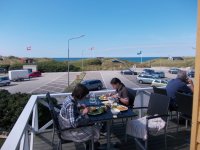
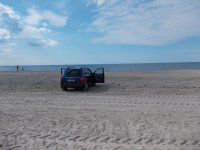 Arriving at Hirtshals we chose, however, to explore a neighbouring village (Tornby Strand). Here we found both a good restaurant for lunch and a broad, long beach along which we drove the car (Danish beachgoers take their car along the beach, find a good spot and then park it and use the car as a sunshade/supply room) and took our siesta on the beach in glorious sunshine – a fitting end to one of our better holidays.
Arriving at Hirtshals we chose, however, to explore a neighbouring village (Tornby Strand). Here we found both a good restaurant for lunch and a broad, long beach along which we drove the car (Danish beachgoers take their car along the beach, find a good spot and then park it and use the car as a sunshade/supply room) and took our siesta on the beach in glorious sunshine – a fitting end to one of our better holidays.
14 August, 4am - A story-book moon and bright star were shining above the lake as we drove back into Ørsdalen after a wonderful holiday, full of experiences. It's good to be home.
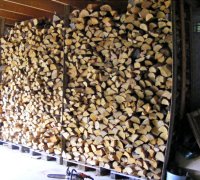 later in the day -
One thing that had been on my mind the whole time we were away was that we were behind with the firewood.
By this time last year all our firewood storage was full; this year, however, it was only a quarter full.
This left a lot of work for the Autumn - and it looks like being an exceptionally busy time, with many concerts and a series of lectures to give for a university on the south coast.
We arrived home to find that Thomas Andrew, in our absence, had taken matters into his own hands.
As well as collecting down off the mountain all the trees I'd previous felled, he felled an additional 30-odd trees and brought those down to the house.
Then he'd chopped them all into sections and split them (the splitting alone took 11 hours).
We're now back on track, with almost enough wood to fill all our storage (photo, left: click for enlargement).
What parents are fortunate enough to be able to go away, confidently leaving house and dogs in the charge of their teenager, and return to unexpectedly find all the winter's wood?
later in the day -
One thing that had been on my mind the whole time we were away was that we were behind with the firewood.
By this time last year all our firewood storage was full; this year, however, it was only a quarter full.
This left a lot of work for the Autumn - and it looks like being an exceptionally busy time, with many concerts and a series of lectures to give for a university on the south coast.
We arrived home to find that Thomas Andrew, in our absence, had taken matters into his own hands.
As well as collecting down off the mountain all the trees I'd previous felled, he felled an additional 30-odd trees and brought those down to the house.
Then he'd chopped them all into sections and split them (the splitting alone took 11 hours).
We're now back on track, with almost enough wood to fill all our storage (photo, left: click for enlargement).
What parents are fortunate enough to be able to go away, confidently leaving house and dogs in the charge of their teenager, and return to unexpectedly find all the winter's wood?
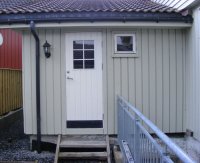 20 August - Back to school.
Both Thomas Andrew and Katie started back at their respective schools today.
For Katie this meant the first of the term's 5.45 am mornings and catching the school bus down at the road before 7am.
The start of a long haul to Christmas.
For Andrew, though, there was no 6 am departure by car.
He moved yesterday evening into his flat in Sandnes, which means a much shorter journey to and from school.
He's very pleased to have his own, parent-free, home (Monday-Friday)!
(Photo of his flat, right: click for enlargement).
20 August - Back to school.
Both Thomas Andrew and Katie started back at their respective schools today.
For Katie this meant the first of the term's 5.45 am mornings and catching the school bus down at the road before 7am.
The start of a long haul to Christmas.
For Andrew, though, there was no 6 am departure by car.
He moved yesterday evening into his flat in Sandnes, which means a much shorter journey to and from school.
He's very pleased to have his own, parent-free, home (Monday-Friday)!
(Photo of his flat, right: click for enlargement).
Andrew pointed out this news story on the BBC - "Norwegian driver hits bear after trying to avoid elk. A Norwegian driver who tried to avoid crashing into an elk hit a bear instead, a wildlife official said." It's a wonderful story, even though it's not quite accurate (according to the Norwegian news the family first avoided the moose and then - rather shaken - drove for another 5 minutes before the bear jumped out in front of them). The perils of driving in Norway.
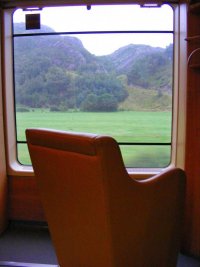 22 August - Avoiding the perils of driving in Norway, I (Tim) took the train to Kristiansand today.
It's only two hours on the train from Egersund to Kristiansand and these two hours were spent in a comfortable armchair (photo, left: click for enlargement) with free coffee and newspapers, unlimited legroom and a landscape of mountains, lakes, waterfalls and seashore gliding by.
Absolute bliss. And the train (as usual) departed and arrived exactly on time in both directions.
Some of our oldest memories in Norway involve train travel. We used to take the train sometimes from Oslo to Mo i Rana (the nearest railway station to Lurøy):
a full 24-hour journey of which the first half was the day train from Oslo to Trondheim and the second half was the wonderfully-uncomfortable and clanky night train from Trondheim to Mo.
Although both were compartment trains, the corridors always used to be full of people for the first part of each journey -
on leaving Oslo because the train's toilets, which emptied directly onto the track, were closed until the train had passed the aptly-named town of Lillestrøm (which means "little stream" in Norwegian) which marks the end of the Oslo connurbation,
and on leaving Trondheim because of the general feeling of cameraderie before everyone squeezed themselves into the triple-bunked cubby holes in which they were to spend the night.
Those days have long gone, but the romance and endurance of train travel left such a mark on people that when Norwegian children's television bought the rights to make a Norwegian version of the American "Sesame Street" the backdrop for the programme was a railway station (and the programme was called Sesame Station).
Egersund Station (which is actually less than an hour's drive from Ørsdalen - in itself quite an achievement) even looks like a station should - an old-fashioned rectangular building (see lower picture under the enlargement of the train seat) - and is a friendly place, with unlimited free parking.
22 August - Avoiding the perils of driving in Norway, I (Tim) took the train to Kristiansand today.
It's only two hours on the train from Egersund to Kristiansand and these two hours were spent in a comfortable armchair (photo, left: click for enlargement) with free coffee and newspapers, unlimited legroom and a landscape of mountains, lakes, waterfalls and seashore gliding by.
Absolute bliss. And the train (as usual) departed and arrived exactly on time in both directions.
Some of our oldest memories in Norway involve train travel. We used to take the train sometimes from Oslo to Mo i Rana (the nearest railway station to Lurøy):
a full 24-hour journey of which the first half was the day train from Oslo to Trondheim and the second half was the wonderfully-uncomfortable and clanky night train from Trondheim to Mo.
Although both were compartment trains, the corridors always used to be full of people for the first part of each journey -
on leaving Oslo because the train's toilets, which emptied directly onto the track, were closed until the train had passed the aptly-named town of Lillestrøm (which means "little stream" in Norwegian) which marks the end of the Oslo connurbation,
and on leaving Trondheim because of the general feeling of cameraderie before everyone squeezed themselves into the triple-bunked cubby holes in which they were to spend the night.
Those days have long gone, but the romance and endurance of train travel left such a mark on people that when Norwegian children's television bought the rights to make a Norwegian version of the American "Sesame Street" the backdrop for the programme was a railway station (and the programme was called Sesame Station).
Egersund Station (which is actually less than an hour's drive from Ørsdalen - in itself quite an achievement) even looks like a station should - an old-fashioned rectangular building (see lower picture under the enlargement of the train seat) - and is a friendly place, with unlimited free parking.
I was travelling to Kristiansand for the first of several times this term because I'm teaching an early-music history course at a university there, which is very enjoyable.
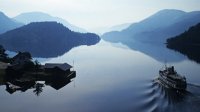 23 August -
A couple of years ago, Norwegian television had great success by filming the entire train journey from Bergen to Oslo and showing it live on the main national channel (all 9 hours or so).
This proved so popular - the programme being watched by about a third of the population - that they followed it up last year by showing, live, a complete journey with the Hurtigruten coastal steamer from Bergen to Kirkenes (a 134-hour programme).
This programme was watched by three-quarters of the population of Norway as well as by many people abroad.
This year's programme is on a rather smaller scale - a 10-hour programme following the MS Victoria along Norway's Telemark Canal (photo, above right - click for enlargement).
We've never actually been to this canal, so perhaps we'll watch some of the programme.
But what seems puzzling is that, according to the publicity, the programme will be broadcast on national television - and radio.
Radio?
23 August -
A couple of years ago, Norwegian television had great success by filming the entire train journey from Bergen to Oslo and showing it live on the main national channel (all 9 hours or so).
This proved so popular - the programme being watched by about a third of the population - that they followed it up last year by showing, live, a complete journey with the Hurtigruten coastal steamer from Bergen to Kirkenes (a 134-hour programme).
This programme was watched by three-quarters of the population of Norway as well as by many people abroad.
This year's programme is on a rather smaller scale - a 10-hour programme following the MS Victoria along Norway's Telemark Canal (photo, above right - click for enlargement).
We've never actually been to this canal, so perhaps we'll watch some of the programme.
But what seems puzzling is that, according to the publicity, the programme will be broadcast on national television - and radio.
Radio?
The broadcast was very popular - one in three Norwegians watched some of it and a twelth of the population watched the whole 10 hours, apparently!
You can see the whole thing (or any part of it) here.
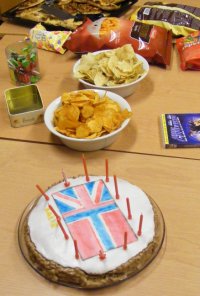
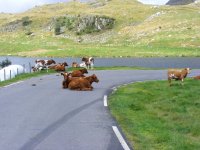 No elk or bears, but driving today was not without its obstructions.
That the road is full of sheep is normal, of course, but now the cows are utterly refusing to move as well
(photo, right: click for enlargement).
The wet tyre tracks on the photo are because I'd had to drive over the field to get round them.
No elk or bears, but driving today was not without its obstructions.
That the road is full of sheep is normal, of course, but now the cows are utterly refusing to move as well
(photo, right: click for enlargement).
The wet tyre tracks on the photo are because I'd had to drive over the field to get round them.
25 August - Katie's 12½th birthday. You may remember that Katie's birthday party was cancelled due to bad weather (see report on 5 February) and that we had "promised to re-schedule the event for a warmer season" so she's had an "official" birthday party today. Have you ever been to one of those birthday parties where everything goes perfectly according to plan and all is calm and controlled? No, we haven't either. An entire class of 12-year-olds, all of whom turned up nearly half an hour early (everyone assumes that Ørsdalen is even further away than it really is, so they allow far too much time to get here from Vikeså), kept us on our toes, so there was no time to take a single photo (apart from this one - left - of the aftermath) and we're now at home feeling exhausted. There wasn't even time to eat the birthday cake, so we're going to get a good sugar rush here tomorrow. But they all seemed to enjoy themselves - lots of pizza and a good film is a safe recipe - and Katie is now counting her takings (£105 in present money, some of which she's intending to take to the Oslo horse show).
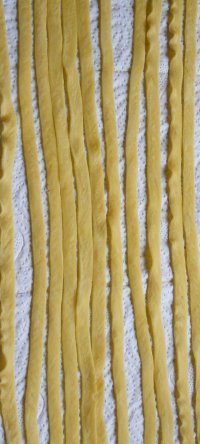 It's not just here that we're having trouble with cows taking over the roads.
Here (below left, click for enlargement) is a picture from a major cycle race in Norway today.
It's not just here that we're having trouble with cows taking over the roads.
Here (below left, click for enlargement) is a picture from a major cycle race in Norway today.
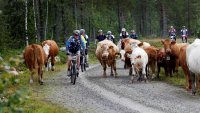 Tomorrow, Katie will be making butter at a local farm.
Tomorrow, Katie will be making butter at a local farm.
28 August - Now that we have lots of butter we've harvested the tagliatelli plantation.
Tracy's excellent home-made tagliatelli for tea (photo, right - click for enlargement).
Maybe now we'll be able to go fishing as well (if you don't quite see the connection, this is a reference to a previous fishing story).
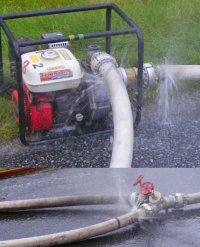 29 August - Village fire practice.
As you will remember, since we are too far away for the fire brigade to come, the residents of Ørsdalen operate our own fire service, for which we have regular practices.
This evening's practice, as usual, involved the adults setting up the equipment and the children hosing each other down (to see picture sequence click small photo, left).
29 August - Village fire practice.
As you will remember, since we are too far away for the fire brigade to come, the residents of Ørsdalen operate our own fire service, for which we have regular practices.
This evening's practice, as usual, involved the adults setting up the equipment and the children hosing each other down (to see picture sequence click small photo, left).